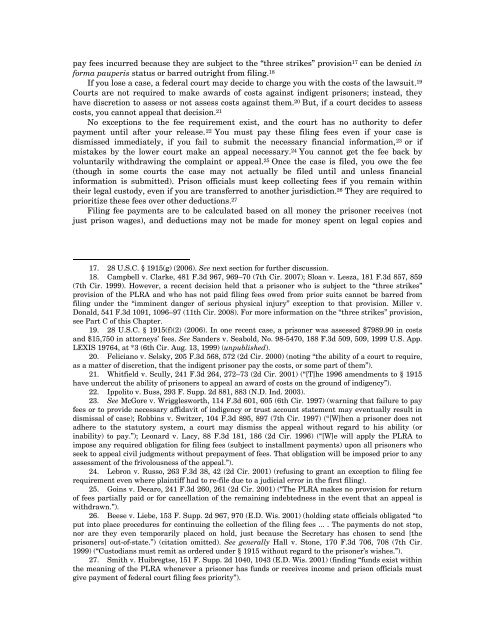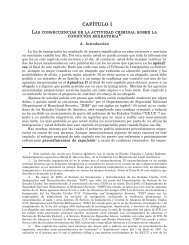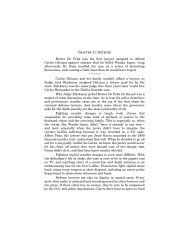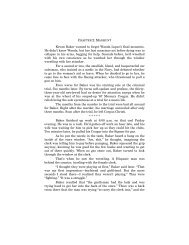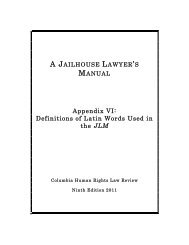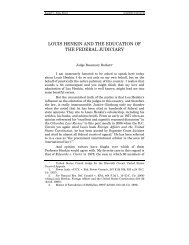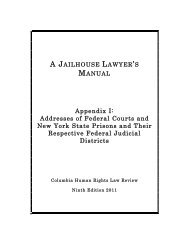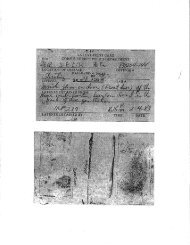A Jailhouse Lawyer's Manual Chapter 14 - Columbia Law School
A Jailhouse Lawyer's Manual Chapter 14 - Columbia Law School
A Jailhouse Lawyer's Manual Chapter 14 - Columbia Law School
Create successful ePaper yourself
Turn your PDF publications into a flip-book with our unique Google optimized e-Paper software.
pay fees incurred because they are subject to the “three strikes” provision 17 can be denied in<br />
forma pauperis status or barred outright from filing. 18<br />
If you lose a case, a federal court may decide to charge you with the costs of the lawsuit. 19<br />
Courts are not required to make awards of costs against indigent prisoners; instead, they<br />
have discretion to assess or not assess costs against them. 20 But, if a court decides to assess<br />
costs, you cannot appeal that decision. 21<br />
No exceptions to the fee requirement exist, and the court has no authority to defer<br />
payment until after your release. 22 You must pay these filing fees even if your case is<br />
dismissed immediately, if you fail to submit the necessary financial information, 23 or if<br />
mistakes by the lower court make an appeal necessary. 24 You cannot get the fee back by<br />
voluntarily withdrawing the complaint or appeal. 25 Once the case is filed, you owe the fee<br />
(though in some courts the case may not actually be filed until and unless financial<br />
information is submitted). Prison officials must keep collecting fees if you remain within<br />
their legal custody, even if you are transferred to another jurisdiction. 26 They are required to<br />
prioritize these fees over other deductions. 27<br />
Filing fee payments are to be calculated based on all money the prisoner receives (not<br />
just prison wages), and deductions may not be made for money spent on legal copies and<br />
17. 28 U.S.C. § 1915(g) (2006). See next section for further discussion.<br />
18. Campbell v. Clarke, 481 F.3d 967, 969–70 (7th Cir. 2007); Sloan v. Lesza, 181 F.3d 857, 859<br />
(7th Cir. 1999). However, a recent decision held that a prisoner who is subject to the “three strikes”<br />
provision of the PLRA and who has not paid filing fees owed from prior suits cannot be barred from<br />
filing under the “imminent danger of serious physical injury” exception to that provision. Miller v.<br />
Donald, 541 F.3d 1091, 1096–97 (11th Cir. 2008). For more information on the “three strikes” provision,<br />
see Part C of this <strong>Chapter</strong>.<br />
19. 28 U.S.C. § 1915(f)(2) (2006). In one recent case, a prisoner was assessed $7989.90 in costs<br />
and $15,750 in attorneys’ fees. See Sanders v. Seabold, No. 98-5470, 188 F.3d 509, 509, 1999 U.S. App.<br />
LEXIS 19764, at *3 (6th Cir. Aug. 13, 1999) (unpublished).<br />
20. Feliciano v. Selsky, 205 F.3d 568, 572 (2d Cir. 2000) (noting “the ability of a court to require,<br />
as a matter of discretion, that the indigent prisoner pay the costs, or some part of them”).<br />
21. Whitfield v. Scully, 241 F.3d 264, 272–73 (2d Cir. 2001) (“[T]he 1996 amendments to § 1915<br />
have undercut the ability of prisoners to appeal an award of costs on the ground of indigency”).<br />
22. Ippolito v. Buss, 293 F. Supp. 2d 881, 883 (N.D. Ind. 2003).<br />
23. See McGore v. Wrigglesworth, 1<strong>14</strong> F.3d 601, 605 (6th Cir. 1997) (warning that failure to pay<br />
fees or to provide necessary affidavit of indigency or trust account statement may eventually result in<br />
dismissal of case); Robbins v. Switzer, 104 F.3d 895, 897 (7th Cir. 1997) (“[W]hen a prisoner does not<br />
adhere to the statutory system, a court may dismiss the appeal without regard to his ability (or<br />
inability) to pay.”); Leonard v. Lacy, 88 F.3d 181, 186 (2d Cir. 1996) (“[W]e will apply the PLRA to<br />
impose any required obligation for filing fees (subject to installment payments) upon all prisoners who<br />
seek to appeal civil judgments without prepayment of fees. That obligation will be imposed prior to any<br />
assessment of the frivolousness of the appeal.”).<br />
24. Lebron v. Russo, 263 F.3d 38, 42 (2d Cir. 2001) (refusing to grant an exception to filing fee<br />
requirement even where plaintiff had to re-file due to a judicial error in the first filing).<br />
25. Goins v. Decaro, 241 F.3d 260, 261 (2d Cir. 2001) (“The PLRA makes no provision for return<br />
of fees partially paid or for cancellation of the remaining indebtedness in the event that an appeal is<br />
withdrawn.”).<br />
26. Beese v. Liebe, 153 F. Supp. 2d 967, 970 (E.D. Wis. 2001) (holding state officials obligated “to<br />
put into place procedures for continuing the collection of the filing fees ... . The payments do not stop,<br />
nor are they even temporarily placed on hold, just because the Secretary has chosen to send [the<br />
prisoners] out-of-state.”) (citation omitted). See generally Hall v. Stone, 170 F.3d 706, 708 (7th Cir.<br />
1999) (“Custodians must remit as ordered under § 1915 without regard to the prisoner’s wishes.”).<br />
27. Smith v. Huibregtse, 151 F. Supp. 2d 1040, 1043 (E.D. Wis. 2001) (finding “funds exist within<br />
the meaning of the PLRA whenever a prisoner has funds or receives income and prison officials must<br />
give payment of federal court filing fees priority”).


